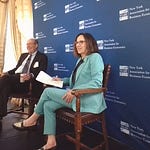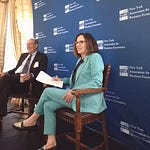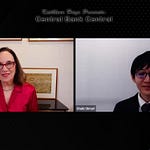Rob Kaplan, who is back at Goldman Sachs as vice-chairman after his 6-year stint at the Federal Reserve Bank of Dallas, has a precautionary message when asked if and how the Trump Administration’s coming policy measures may the Fed’s rate-cutting path as it heads toward its December meeting.
It takes me back to the historic policy dissent he made at the FOMC’s September 2020 meeting when he warned that pledging to keep the keep the key rate near zero until inflation was at or above 2% and climbing would rob the the Fed of the policy flexibility it needed to move rates up when needed. With hindsight, many agree that the Rob was right, as the Fed waited too long to start raising rates, and inflation got of out control, with damaging consequences that linger to this day.
Now, Rob is looking beyond the Fed’s current cyclical policy of cutting rates based on how quickly inflation recedes and the labor market cools off. He is warning that as the structural forces in the economy look to be upended by Donald Trump’s plans for tariffs, mass deportations of migrants, regulatory changes and more, the Fed will have to take these shifting dynamics into account in its policy deliberations and slow the pace of rate cuts it has had baked into its monetary policy cake.
”We haven't been through a structural shift in a few years. Post -COVID, we had to go through one. And I think if you're at the Fed, you have to be aware of it and and realize you're not going to have clarity on these puzzle pieces in the near term…(that it) may take several months. And I think that may cause the Fed to slow down a bit,” Rob says.
” I don't know if that means ‘pause,’ but I think they're going to have to assess how these different structural changes and policy changes into next year might affect unemployment and inflation,” he adds.
Rob notes that markets still expect another 25bps rate cut at the Fed’s last meeting of the year in December, and he still sees this door open as well.
He also says “Jay Powell was appropriately non-committal…not committing to actually moving in December…I think that was appropriate. And so I'd be using, if I were in my former seat, I'd be using every possible moment, and would not be rigid or predetermined on what we're going do from here.”
We covered a lot of ground in this interview: his concern that mass deportations could shrink the available labor force that will be needed if Trump’s plan to use tariffs to entice overseas firms to invest in U.S. production facilities is to succeed, what is causing U.S bond yields to rise, why the Fed’s December dot plots for the number of rate cuts in 2025 may be cut back for now, and much more.
So dive in, see, hear what Rob has to say and why. He also says more than once in our conversation that now is not the time for Jay Powell and his team to be economic data prognosticators. Now is the time for them to be risk managers as the financial markets and policy makers around the world wait to see how Trump 2.0 plays out now and in the months to come.
Robert Steven Kaplan is a partner and Vice Chairman at Goldman Sachs, where he gives strategic advice to clients globally and works closely with teams across global banking and markets, and asset and wealth management. He serves as a member of the Management Committee and Executive Office at Goldman Sachs and is based in Dallas, Texas. He previously served as the President and CEO of the Federal Reserve Bank of Dallas from 2015 until 2021. In this role he managed the 1,300 employees of the Dallas Fed and represented the Eleventh Federal Reserve District on the Federal Open Market Committee in the formulation of U.S. monetary policy.
Kaplan was previously the Martin Marshall Professor of Management Practice and a Senior Associate Dean at Harvard Business School. Prior to joining Harvard, Kaplan was Vice Chairman of the Goldman Sachs Group with global responsibility for the firm’s investment banking and investment management divisions.
He serves as Chairman of Project A.L.S. and Co-Chairman of the Draper Richards Kaplan Foundation. He is a board member of Harvard Medical School, St. Mark’s School of Texas and is a member of the Advisory Council of the George W. Bush Institute. Kaplan is an Executive Committee Member of the Baker Institute and a Member of the Board of Directors of the SMU Tate Lecture Series. Previously he served as Chairman of the Investment Advisory Committee at Google and a trustee of the Ford Foundation. He was appointed by the Governor of Kansas as a member of the Kansas Health Policy Authority Board.
Kaplan has authored three books, titled What You Really Need to Lead: The Power of Thinking and Acting Like an Owner; What You’re Really Meant To Do: A Road Map for Reaching Your Unique Potential; and What to Ask the Person in the Mirror: Critical Questions for Becoming a More Effective Leader and Reaching Your Potential.
He received a bachelor’s degree in business administration from the University of Kansas and a master’s degree in business administration from Harvard Business School. He lives in Dallas, Texas.













Share this post